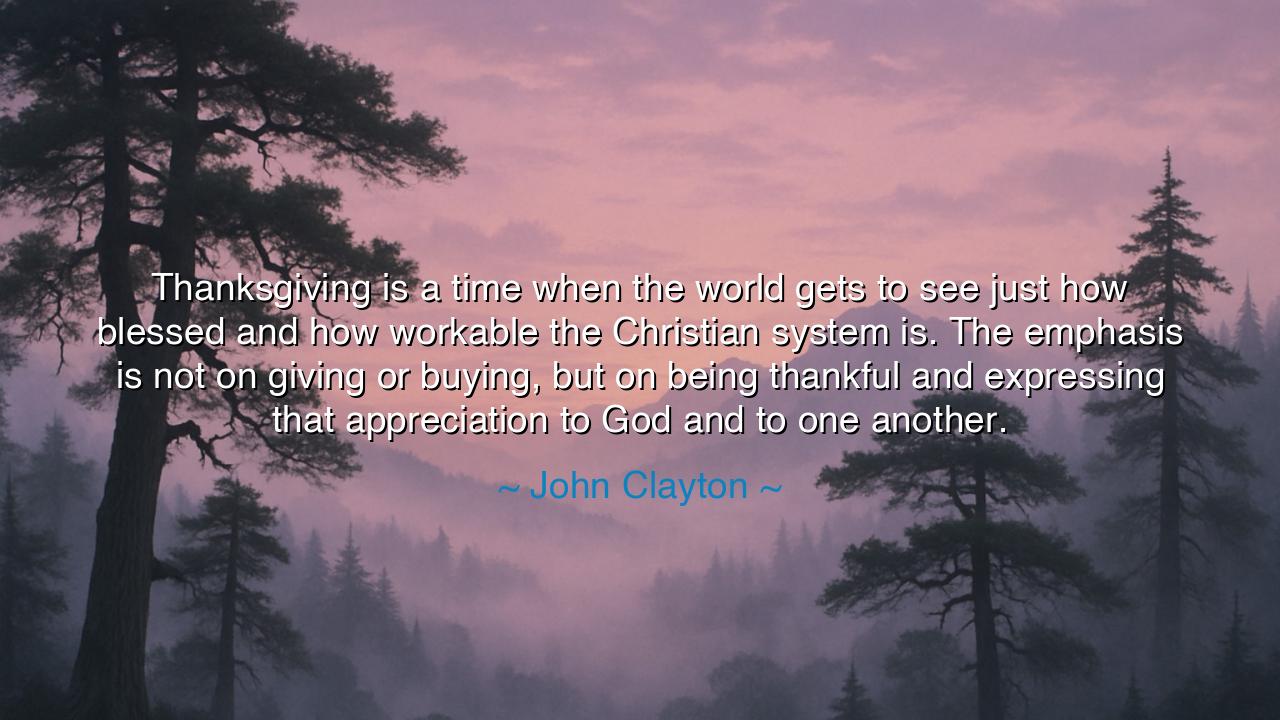
Thanksgiving is a time when the world gets to see just how
Thanksgiving is a time when the world gets to see just how blessed and how workable the Christian system is. The emphasis is not on giving or buying, but on being thankful and expressing that appreciation to God and to one another.






John Clayton, with a spirit steeped in reverence, declared: “Thanksgiving is a time when the world gets to see just how blessed and how workable the Christian system is. The emphasis is not on giving or buying, but on being thankful and expressing that appreciation to God and to one another.” In these words we hear not merely a reflection on a holiday, but a profound meditation on the very heart of gratitude. He reminds us that the true power of Thanksgiving lies not in feasting or commerce, but in the sacred act of acknowledging blessings—blessings received from heaven above, and blessings shared among humankind.
The origin of this vision is found in the story of the Pilgrims and the Native peoples of early America, when the first great feast of thanksgiving was held after a harsh season of trial and survival. They gathered not in abundance but in relief, not in luxury but in recognition that Providence had sustained them. Clayton’s words echo that moment, showing how the Christian system—with its call to humility, thankfulness, and fellowship—was not merely theory but practice. It bound communities together, uplifted the poor in spirit, and reminded all that life itself was a gift to be honored with gratitude.
Clayton contrasts Thanksgiving with the other festivals of the modern world. While many days are now consumed with buying, selling, and giving for the sake of display, Thanksgiving stands apart. Its greatness lies in its simplicity: it asks us not to consume more, but to reflect more deeply; not to give lavishly from wealth, but to give humbly from the heart. In this sense, it returns us to the wisdom of the ancients, who taught that gratitude is the mother of all virtues, the foundation upon which every good deed rests.
Consider the story of George Washington, who in 1789 proclaimed the first national day of Thanksgiving in the United States. At that time, the nation was young, its future uncertain, and its people weary from years of conflict. Yet Washington called upon all citizens not to despair or grasp at gain, but to set aside a day of thanks to Almighty God for deliverance and hope. Like Clayton, he saw that gratitude unites, while greed divides; that thanksgiving strengthens the soul, while consumption weakens it. This spirit of humility and honor has echoed through the centuries whenever the holiday is rightly observed.
The heart of Clayton’s message is that thankfulness itself is transformative. When we pause to give thanks, we re-order our hearts. We cease to see life as a struggle for possession and begin to see it as a communion of blessings—gifts from God, from family, from neighbor, from friend. It is in this way that Thanksgiving becomes a testimony to the world: a living demonstration of a system of faith that is not only lofty in word but workable in practice, building bonds of peace and harmony.
The lesson for us is clear: cultivate thankfulness not only on the holiday, but every day. Do not let your heart be consumed by the endless cycle of buying and giving for display, but by the quiet power of expressing appreciation. Give thanks first to God, who sustains all things, and then to those around you—family, friends, even strangers—whose kindness has touched your life. For gratitude, when spoken aloud, multiplies; it lifts both the one who gives it and the one who receives it.
Practical action flows easily from this wisdom. Begin each day with a prayer of thanks for breath and life. Keep a journal of blessings received, however small. Speak gratitude daily to those who labor for you, whether they be kin or strangers. And when Thanksgiving itself arrives, let your table not only be filled with food, but your hearts be filled with the words of appreciation that bind generations together. In this way, the holiday will not be an empty feast, but a true celebration of thankfulness and faith.
Thus, John Clayton’s words endure as a reminder that the true meaning of Thanksgiving is not measured in abundance or display, but in the purity of gratitude. To be thankful is to honor God, to uplift others, and to show the world that faith lived with humility is not only possible, but powerful. For thankfulness is the seed of peace, and peace is the harvest of gratitude.






AAdministratorAdministrator
Welcome, honored guests. Please leave a comment, we will respond soon